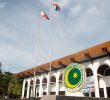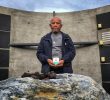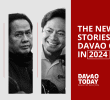SINGAPORE (via PLDT) � President Gloria Macapagal-Arroyo urged today the world�s top business and political leaders to look beyond the present to the next 20-40 years of an increasingly complex and uncertain global environment.
Looking 20-40 years into the future, “we see increasing integration and prosperity (but) at the same time, the likelihood of greater income disparity,” the President said in her opening address before the World Economic Forum (WEF) on Asia 2007 at the Shangri-La Hotel here.
Citing the contradictions gripping the world today, the President said: “We see a more peaceful world, yet more countries with nuclear capability. We see a cleaner environment, yet in achieving that, we must first address the challenge of global warming.”
“Balancing these contradictions will be the test of leadership in the region,” she said.
She asserted that the real issue is not about leadership deficit, because the region has any number of able leaders of strong nations as well as institutions like the Association of Southeast Asian Nations (Asean) to provide individual, regional and multilateral global leadership.
Rather, the real issue is the rapid economic rise of the region at a time when the global order has undergone enormous swings, she said.
“One swing was caused by the rise of China and India to add to the power of Japan in the region. Another was the global war on terrorism which has influenced America�s role in the world and in Asia,” the President said.
She pointed out that as the major political and military player, the United States has been preoccupied with Iraq in the Middle East and other crisis areas.
This, the President said, has left the perception of a leadership deficit in Asia and has also left the impression that there is a political “opening” for others such as China and Japan to fill.
She also pointed out that China and Japan have stepped up their game, notably in coming together to facilitate peace on the Korean Peninsula. “Yet, this is the interim game: the real issue is how the region will handle the next 20 or 40 years.”
As the region�s largest source of official development assistance (ODA), Japan will provide leadership to the important arena of sustainable development, she said.
“We would like to see Japan playing a leading role in contributing to integration in the region and maintaining and pursuing international peace and security as we try to forge the East Asia community,” the President said.
She added that as China and India become true political and economic giants, their leadership obligations to their neighbors also increase, separate from their obligations to their own citizens.
The President said that while Japan, China and India are active participants in the East Asia summit, which has the Association of Southeast Asian Nations (Asean) in the driver�s seat, it is through Asean�s leadership that the vision of an East Asia Community, once unthinkable and believed unattainable in this lifetime, is gradually taking shape,” she added.
As chair of Asean this year, the President recalled that during the Asean Summit last January in Cebu City, Asean exercised leadership in integration by taking several important steps to “create a regional community by 2015.”
The most notable of which, the President said, was the declaration on the Asean Charter. “At a time of uncertainty in the world, we are proud that Asean took a bold step forward and not a timid step back,” the President said. (OPS)
World









